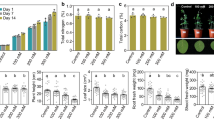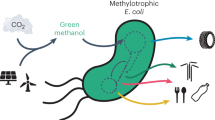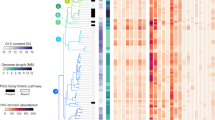Abstract
Ethanol accumulation in aerobic batch cultures of Pachysolen tannophilus growing on D-xylose is associated with a transition to a state of low oxygen consumption, and the events triggering the accumulation differ from those of a Crabtree effect. The transition explains the accumulation of ethanol at only a particular interval during the growth of the culture, shows that such accumulation is not dependent on limited oxygen supply, and offers approaches to enhancing the yield of ethanol.
This is a preview of subscription content, access via your institution
Access options
Subscribe to this journal
Receive 12 print issues and online access
$209.00 per year
only $17.42 per issue
Buy this article
- Purchase on Springer Link
- Instant access to full article PDF
Prices may be subject to local taxes which are calculated during checkout
Similar content being viewed by others
References
Rydholm, S.A. 1965. Pulping Processes, p. 97. Interscience Publishers, New York.
Maleszka, R., Veliky, I.A. and Schneider, H. 1981. Enhanced rate of ethanol production from D-xylose using recycled or immobilized cells of Pachysolen tannophilus. Biotechnol. Lett. 3: 415–420.
Slininger, P.J., Bothast, R.J., Van Cauwenberge, J.E. and Kurtzman, C.P. 1982. Conversion of D-xylose to ethanol by the yeast Pachysolen tannophilus. Biotechnol. and Bioeng. 24: 371–384.
du Preez, J.C. and van der Walt, J.P. 1983. Fermentation of D-xylose to ethanol by a strain of Candida shehatae. Biotechnol. Lett. 5: 357–362.
Slapack, G., Edey, E., Mahmourides, G. and Schneider, H. 1984. Ethanol from hexoses and pentoses in spent sulfite liquor. In: Biotechnology Advances, M. Moo-Young, (ed.), Pergamon Press. In press.
Margaritis, A. and Bajpai, P. 1982. Direct fermentation of D-xylose to ethanol by Kluyveromyces marxianus strains. Appl. Environ. Microbiol. 44: 1039–1041.
Gong, C.-S., McCracken, L.D. and Tsao, G.T. 1981. Direct fermentation of D-xylose to ethanol by a xylose-fermenting yeast mutant, Candida sp. XF217. Biotechnol. Lett. 3: 245–250.
Fietcher, A., Fuhrmann, G.F. and Kappeli, O. 1981. Regulation of glucose metabolism in growing yeast cells. Adv. Microbiol. Physiol. 22: 123–183.
Maleszka, R. and Schneider, H. 1982. Fermentation of D-xylose, xylitol and D-xylulose by yeasts. Can. J. Microbiol. 28: 360–363.
Schneider, H., Maleszka, R., Neirinck, L., Veliky, I.A., Wang, P.Y. and Chan, Y.K. 1983. Ethanol production from D-xylose and several other carbohydrates by Pachysolen tannophilus and other yeasts. Adv. in Biochem. Engineering/Biotechnology 27: 57–71.
du Preez, J.C., Prior, B.A. and Monteiro, A.M.T. 1984. The effect of aeration on xylose fermentation by Candida shehatae and Pachysolen tannophilus. Arch. Microbiol. Biotechnol. 19: 261–266.
Baillargeon, M.W., Jansen, N.B., Gong, C.S. and Tsao, G.T. 1983. Effect of oxygen uptake rate on ethanol production by a xylose-fermenting yeast mutant, Candida sp. XF217. Biotechnol. Lett. 5: 339–344.
Jeffries, T.W. 1981. Conversion of xylose to ethanol under aerobic conditions by Candida tropicalis. Biotechnol. Lett. 3: 213–218.
Schvester, P., Robinson, C.W. and Moo-Young, M. 1983. Xylose fermentation to ethanol by Pachysolen tannophilus. Biotech. Bioeng. Symp. 13: 131–152.
Debus, D., Methner, H., Schulze, D. and Dellweg, H. 1983. Fermentation of xylose with the yeast Pachysolen tannophilus. Eur. J. Appl. Microbiol. Technol. 17: 287–291.
Maleszka, R. and Schneider, H. 1982. Concurrent production and consumption of ethanol by cultures of Pachysolen tannophilus growing on D-xylose. Appl. Environ. Microbiol. 44: 909–912.
Mahmourides, G., Maleszka, R., James, A.P. and Schneider, H. 1983. Mutants of Pachysolen tannophilus that produce enhanced amounts of acetic acid from D-xylose and other sugars. Biotechnol. Lett. 5: 29–32.
Woehrer, W. and Roehr, M. 1981. Regulatory aspects of bakers' yeast metabolism in aerobic fed-batch cultures. Biotechnol. Bioeng. 23: 567–581.
Magdalena, P., Kappeli, O. and Fiechter, A. 1983. An expanded concept for the glucose effect in the yeast Saccharomyces cerevisiae. Involvement of short- and long-term regulation. J. Gen. Microbiol. 129: 43–49.
Utter, M.F., Duell, E.A. and Bernofsky, C. 1968. Alterations in the respiratory enzymes of the mitochondria of growing and resting yeast, p. 197–215. In: Aspects of Yeast Metabolism, A. K. Mills and H. Krebs (eds.), Blackwell Scientific Publications, Oxford and Edinburgh.
Author information
Authors and Affiliations
Rights and permissions
About this article
Cite this article
Mahmourides, G., Lee, H., Maki, N. et al. Ethanol Accumulation in Cultures of Pachysolen Tannophilus on D-Xylose is Associated with a Transition to a State of Low Oxygen Consumption. Nat Biotechnol 3, 59–62 (1985). https://doi.org/10.1038/nbt0185-59
Received:
Accepted:
Issue Date:
DOI: https://doi.org/10.1038/nbt0185-59
This article is cited by
-
Genetic improvement of native xylose-fermenting yeasts for ethanol production
Journal of Industrial Microbiology & Biotechnology (2015)
-
Levels of pentose phosphate pathway enzymes fromCandida shehatae grown in continuous culture
Applied Microbiology and Biotechnology (1988)



